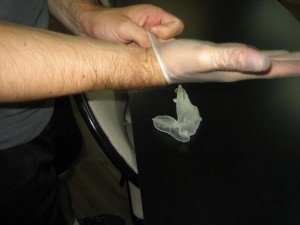Erythema multiforme is a common skin condition in response to an allergic reaction or infection. Basic anaphylactic shock recognition and management is covered in a standard first aid course. Erythema mutliforme is a type of hypersensitivity reaction that occurs upon body exposure to particular medications, illnesses and infections. It commonly occurs in children and young adults.Also, it is more common in men than women.
Erythema multiforme is divided between into two forms: major and minor. Major erythema multiforme is more severe and potentially life-threatening. It involves the skin and mucosa. On the other hand, erythema multiforme minor also affects the skin and the mucosa but very minimal. It is acute and can be managed at home, whereas its major counterpart may require medical treatment and even confinement.
Erythema Multiforme Causes
The exact cause of erythema multiforme is unknown.The disease is assumed to initially damage the blood vessels of the skin leading to damage to the skin tissues.Erythema multiforme can be caused by a wide spectrum of causes, which range from infections,certain illnesses, and taking particular medications. In some cases, the cause is unknown. These include:
- Infections
- Herpes simplex (most common)
- Mycoplasma
- Illnesses: collagen diseases
- Medications
- Sulphonamides (most common medication-causing)
- Penicillin
- Non-steroidal anti-inflammatory drugs
- Oral contraceptives
- Anticonvulsants
- Phenytoin
- Use of cocaine
Erythema Multiforme Symptoms
Symptoms for erythema multiforme will depend on the severity of the hypersensitivity, thus symptoms may be mild or severe. The common symptoms are the following:
- Multiple skin lesions
- Usually target-like circles with a “bull’s-eye” in the centre surrounded by pale red rings
- Appear quickly and may recur and spread
- Hive-like appearance of the nodules, papules or macules
- Blisters and vesicles
- Initially found on the hands and feet but may spread to the upper body, arms, and legs, and sometimes on the face and lips
- Symmetrical
- Skin itching
- Fever
- Malaise
- Aching of the joints
- Dry, bloodshot and painful eyes with burning sensation and discharge
- Mouth sores
- Change in vision
Erythema Multiforme Risk Factors
The following factors increase a person’s chance of developing erythema multiforme:
- History of erythema multiforme
- History of cold sores or genital herpes
- HIV positive patients
Erythema Multiforme Treatment

In most cases of erythema multiforme, medical treatment is not essential as rashes will disappear after several weeks without usually developing complications. With appropriate home treatment, erythema multiforme can be managed. The main purposes of administering first aid for cases of erythema multiforme are to control the illness, treat symptoms, and avoid infection.
- If it is causes by a viral infection, take antiviral medications.
- To soothe the skin, place moist compresses on the skin.
- Apply topical anaesthetics to relieve from discomfort, especially for sores found in the mouth.
- To limit itching, take oral antihistamines or apply topical corticosteroids over the skin.
- To minimize fever, acetaminophen or ibuprofen is recommended.
- For severe cases, seek medical treatment immediately.
Disclaimer: This article should not be used for medical diagnosis or medical treatment. To learn more about treating symptoms of various skin diseases, such as erythema multiforme, enrol in First Aid Courses.
